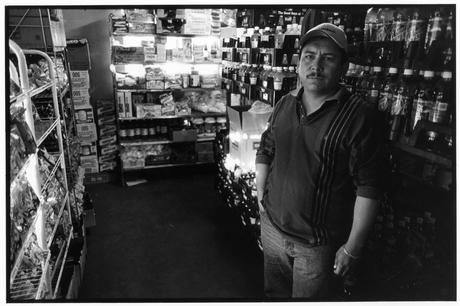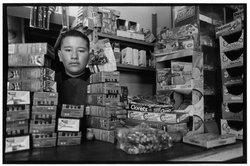
|

|
Cananea
A Blacklisted Miner
project support
from the
Rockefeller Foundation
Interview with Jose Maria Pacheco
Phoenix AZ (12/9/01)
DB: Where were you born?
I was born in Cananea, Sonora. I lived all my life there, until I came to the US.
DB: When did you go into the mine in Cananea?
I started in 1981. I was 18 years old. My father was a miner before me, and his father before him. We could live a decent life then. The money they paid was enough to live on. It was also like a school, in which we learned how to work. You learned how to do many jobs — welding, driving heavy equipment, administration in the warehouse.
I was an apprentice for five years. During that time I could figure out where I would be able to develop the most. I became a mechanic, and after three years, I was in charge of the other mechanics and the shop.

|
|
Phoenix, Arizona 12/7/01 Chema Pacheco, a leader of the Cananea strike against privatization and layoffs in 1998, was blacklisted, and crossed the border to look for work in the US. He helps run a business supplying catering trucks. |
DB: Were you also an activist in the union?
Yes, I was a member of Seccion 65. I was with my coworkers in the struggle the whole time. I participated in all the movements.
I wanted to help people. That was why we began our movement, but the company opposed us. They wouldn't let us move forward. And then they threw us out.
DB: How did the movement of 1998 get started?
It had its origin in the struggle we began over our union contract. The people who had bought the mine sought to impose their own set of rules. But we already had a contract in which it stated clearly what we were supposed to do. They didn't want to accept this, and they said they didn't want to pay the bonuses that the contract specified.
DB: How much were you earning at that time?
I was making about 750 pesos a week. I had a family and three kids by then. It was more or less enough to live on. We still had to battle a little to do it. So when the company began refusing to pay the bonuses, that hurt because we already depended on them in order to survive. The bonus was between 250 and 300 pesos of the 750 we were bringing home each week. It was the same as cutting our salary, and it didn't leave us enough to be able to maintain our families. We weren't prepared to sustain a cut like that, and it really affected our standard of living.
The first place where they tried to implement this was the First Metallurgical Department, one of the smallest ones, to see how we would react. We sent a commission of workers to Mexico City, but the government wouldn't listen to us. And when they came back, the company retaliated against them by giving them different jobs, assigning them to ones they didn't know how to do to set them up to be fired. After that, many people didn't want to get involved.
DB: Was getting rid of the bonus something permitted under the contract?
Yes. We had a new contract, the famous productivity contract, negotiated by Elias Morales, who was in charge of negotiations for the national union. He told us one thing at the meeting where it was adopted, but the company later interpreted it in their own way. They told us that we were making too much. They imposed new criteria for getting the bonus, and it went badly for us.
When Morales presented the contract, the people didn't agree at first. Then he began to tell us that we would make a lot of money under it. People still didn't agree, but it got late and they began to leave the meeting. I stayed until the end, just as I always did, but we weren't able to do anything. Morales already had his people there who were ready to vote to accept the agreement. At the end, there weren't even fifty people left when they took the vote, and over two thousand of us were working in the mine at that time.
DB: So what happened in 1998?
The movement started again when the contract came up for negotiations again. We decided to stop work. But after fighting with the company for quite a while, instead of making things better, they made them worse.
DB: What did you do during the stoppage?
I was on the committee. I went out to try to get support for the strike. I came here to Phoenix once, and I went to Mexico City as a member of one of the commissions too. I went to all the meetings. We had a lot of support from the US during the strike. When the caravan arrived from Arizona, it lifted our spirits, and we were more determined to keep on fighting. We didn't want the union to fail.
But unfortunately, there were people who were willing to play the company's game. We actually felt we were getting more support from the US than we were from Mexico. But we really never had the support of our national leaders. They lied to us, and didn't respect the decisions we made in the meetings when they went to talk with the company.
People finally went back to work because they couldn't survive without any income. So the ones who had the luck to be accepted back went back to work. We had been out of work for three or four months. We didn't have any alternative to accepting what the company demanded, because there's no other source of jobs in Cananea. People lifted the strike because they didn't have any more money, and they'd already fought for quite a while. They accepted the conditions because they felt they had no alternative.
The company began by shutting down the smelter. Then they shut down the waterworks. So the people who were working in those areas weren't accepted back at the end. The company chose the people that it wanted, and those were the ones they allowed to come back. They began making lists of the people they didn't want, closing departments. In my department, for instance, there were two people they didn't take back, and those were the two of us who were participating in the movement.
They really hurt people a lot, and the union too. And now people don't want to participate in the union anymore, because they saw what happened.

|
|
Caborca, Sonora 12/4/02 The twelve-year old son of Ramon Murrieta minds his father's store in the front of their house. |
DB: What happened to you when the strike ended?
The company posted lists for each department, of the people they were accepting back to their jobs. And when I went to look at the list for my department, my name wasn't on it. I wasn't included — I was out. In the contract, we have a section, number 183 that says when they close a department, they have to give you severance pay. But I wasn't in any list to get pay either. I went to the company office, and spoke to the coordinator for labor relations. He said I wasn't going back. He told me it was because I was such a grillero, a person who always spoke out, who was always involved in the union. I had always had a lot of problems, of confrontations, with him. I never agreed with what he said, because he was always trying to violate the contract. People always knew I was trying to defend the union and the contract, and that's why the company didn't want me to come back.
I could have filed a legal action against them, but I knew I'd never win it. I'd have to get a lawyer, and come up with the money to pay him somehow. I'd probably wind up even worse off. The labor relations coordinator told me they would put me on a blacklist, and I'd never get a job anywhere in Mexico after that. They'd put my name on a flyer and send it to other employers.
The ironic part of it all is that they finally fired him too, even though when he talked to me he acted as though he was an owner of the company himself.
I had no alternative but to leave Cananea. I had to come look for work on the other side, in the US. I still had my house and my family, so I really didn't want to leave Cananea. But there wasn't anything else I could do.
DB: It must have been very bitter to go looking for work in the US after having spent 17 years in the mine in Cananea.
It felt very bad. We fought so hard. I went a year without being able to find a job. There was nothing in Cananea, no job. The whole economy was depressed because so many people had lost their jobs. But thank god, after a while one starts moving forward again. My friends finally asked me to come with them to the United States, that they'd support and help me. I invested my time and energy into this business here.
I don't have any papers, I really have nothing. But there's a group of us here from Cananea, friends, and we help each other. We all went to school together, and then came up here together. Together we've organized this little business here supplying catering trucks. I'd like to go back to Cananea, but there's nothing there for me right now. There are no jobs there. The only thing I can do right now is work here in the US.
My children and my wife are still in Cananea. We talk on the phone a lot. It's been a very drastic change for us. I go back and forth, but it's always a big risk, that they'll take away my passport, or that something will happen to me on the road. I'd like to get some legal status here, but I don't know if it will happen. If there were an amnesty here, it would help me a lot.
My wife still has her job at Telefonos de Mexico in Cananea. I don't know if we'd all be able to survive here in the US, so we don't know if it would be worth it for them to come here. I'm hoping that next year I'll be able to bring them. I don't think I'd go back to the mine, even if I heard they were hiring again. That part of my life is over. I want to have my own business now, the way we're trying to start one here.
WORKPLACE | STRIKES | PORTRAITS | FARMWORKERS | UNIONS | STUDENTS
Special Project: TRANSNATIONAL WORKING COMMUNITIES
HOME | NEWS | STORIES | PHOTOGRAPHS | LINKS
photographs and stories by David Bacon © 1990-
website by DigIt Designs © 1999-